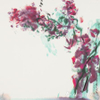分享到微信,
请点击右上角。
再选择[发送朋友]
或[分享到朋友圈]

王清州是一位勤奋的艺术家。他对艺术的涉猎也极为广泛:书法、篆刻、水墨、油画、综合材料、雕塑甚至装置。可见他的勤奋及艺术实践与积累的丰富。

《地水火风》


《我家门前有两棵树》

和王清州老师合作过三次展览,两次水墨展览和一次水墨、雕塑、装置等多种艺术形式综合的展览。从几次展览的作品中,发现了始终贯穿王清州创作的一条主要线索:取象说。这个理论是中国书学的重要命题,用线条将丰富的感情体验作以高度的概括和抽象,在凝聚短暂的一挥中,化客观存在为主观情感,化具象为抽象。研习书法多年的王清州将这个理论融入到绘画创作之中,并提炼概括为具有其个人风格化的艺术形式。
这个特点在他最近云南采风期间创作的一批作品中尤为明显。《红绿翻虎》系列、《地水火风》系列、《我家门前两棵树》、《我前世是不爱动的树》等作品,是他在云南西双版纳时所创造。画面中客观存在的山水、树木在艺术家的眼中全无物象之形,而是经过艺术的提炼概括后转化为富有韵律感的线条和层次丰富的色块。在王清州的观点中,大自然中是没有线条和色彩的,线条和色彩是人对外在物象概括所形成的心理形式。而王清州将这种心理形式用艺术表现出来,就是他画笔下的作品。
王清州的作品构图极具新意,与传统水墨画相比别具一格。在王清州的作品中,他描绘的不再是游人眼中的青山碧水、绿叶红花,而是用艺术家独特的视角将浑莽的大自然抽象化、节奏化、纯净化。值得注意的是,皴法的笔触以及水墨的晕染在画面中都已然消失,而改以线条和色块来经营山水抑或花鸟的造型。借着几何抽象的线条和色块所蕴涵的解放力,王清州一样达到了传统山水所追求的坚实结构,以及形式和空间上的明晰感,显露出他个人内心对自然的热爱及向往。换句话说,王清州在不牺牲表现力的原则下,依然从形式简约的阶段跨进到了形式构成的阶段。从这个角度上看,这跟他多次游历西方,参观西方现代的美术馆博物馆的学习经历有密切的关系。学习西方现代的艺术风格,结合东方传统艺术的体悟,王清州的这一批创作当得起突破这一评价。
王清州的绘画用一种抽象化、净化的幻化之景来表现真实的世界。这得益于他对真实山水世界的感知和具有直觉冥想力的眼睛。记得清华大学美术学院岛子教授这样评价王清州:“王清州的色彩写意从传统文人花鸟画脱胎而来,既蕴涵文人画的要素,又在自然的观察与表征中注入现代艺术语言的表现性乃至抽象性,而现代艺术语言本身有其丰富的思想性。从当代水墨的发展视角来考量,清州的色彩写意创作不失为返本与开新的成功实验。”
可见,对自然的观察正是王清州所有创作的源泉。一如他内心的坚定:“我会继续观察生活,独立艺术实践沉淀,努力创作和探索”。
作者系798先声画廊艺术总监
译文
Only Lush Green Mountains Deserve Tireless Observation
Jiang Yongping
Wang Qingzhou is a diligent artist. He is engaged in a wide range of artistic fields, such as calligraphy, seal engraving, traditional Chinese painting, oil painting, mixed media, sculpture and even installation. It can be seen how hard-working he is and what abundant artistic practice and accumulation he has made.
I have collaborated with him in three exhibitions, including two exhibitions of traditional Chinese painting and one integrating multiple artistic forms such as traditional Chinese painting, sculpture and installation. From his works exhibited, a major clue is found throughout his creation: the theory of observation and abstraction. This theory is an important proposition of Chinese calligraphy. Lines are used for the high generalization and abstraction of rich emotional experience, to translate objective existence into subjective emotion, and the concrete into the abstract, just by concentrating and swift calligraphy creation. With the experience of studying and practicing calligraphy for many years, he integrates this theory with his creation of paintings, and makes it an artistic form in his personal style by refining and generalization.
This feature is embodied obviously in the collection of his works created during his tour of Yunnan recently. The work series of Mighty Color Combinations, Earth, Water, Fire and Wind, and the works of Two Trees in Front of My House, I Was a Lazy Tree in My Previous Life were created during his stay in Xishuangbanna of Yunnan. The mountains, rivers and trees in objective existence are all melting in the eyes of the artist, which are transformed into rhythmic lines and rich layers of blocky colors through artistic refining and generalization. He argues that there are no lines or colors in nature, which are just psychological forms of people generated from generalizing external images. His works are the artistic expression of such psychological forms.
The composition of his works is rather innovative, in a unique style compared with traditional Chinese paintings. What he portrays in the works is no longer the lush mountains and crystal waters and luxuriant plants in the eyes of tourists, but abstract, rhythmic and purified boundless nature from the unique perspective of an artist. It is worth noting that there are no light strokes for showing the shade and texture of rocks and mountains and ink rendering, which are replaced with lines and blocky colors to shape landscape or flowers and birds. He also succeeds in creating the firm structure and the clarity in form and space pursued by artists of traditional Chinese painting, via the liberating force of geometric and abstract lines and blocky colors, which shows the love and yearning for nature in his heart. In other words, under the principle of not sacrificing performance, he still moves through the stage of form simplicity and into that of form composition. From this point of view, this is closely related to his experience of traveling in the Western countries for many times and visiting the modern Western galleries and museums for learning. He learns the modern Western style of art, and combines it with his comprehension of traditional Eastern art. This collection of his works is worthy of being evaluated as breakthroughs.
In his paintings, he uses abstract and purified fantastic scenes to show the real world. All these originate from his perception of real landscape and his observation ability based on intuition and meditation. Professor Daozi of Academy of Arts and Design of Tsinghua University has commented that “Wang Qingzhou’s color freehand paintings are nurtured in traditional flower-and-bird paintings of literati. His paintings contain not only the elements of literati paintings, but also the expressive and abstract properties of modern artistic language injected in the observation and representation of nature. Moreover, modern artistic language itself is rich in ideological content. In view of the development of contemporary Chinese painting, Qingzhou’s color freehand paintings can be regarded as a successful experiment of returning to the original nature and innovating. ”
It can be seen that the observation of nature is the source of all his creations. As he said with firm determination, “I will continue to observe life, carry out artistic practice independently, accumulate experience and make efforts in creation and exploration. ”
作者:姜永平

分享到微信,
请点击右上角。
再选择[发送朋友]
或[分享到朋友圈]

